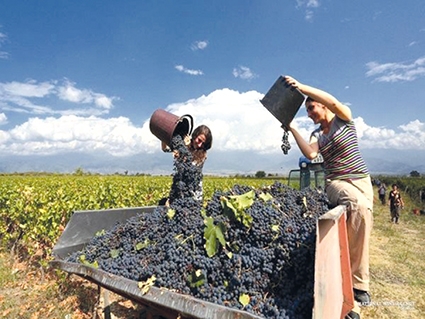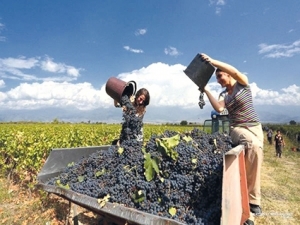Halfway Through the Harvest
The grape harvest in Georgia’s eastern Kakheti region officially began the first week of September. Kakheti is often called Georgia’s cradle of wine for its abundance of wine grapes and winemakers.
The 2018 Harvest Coordination Headquarters opened on August 20, operated by the National Wine Agency (NWA) the Ministry of Environmental Protection and Agriculture, and the Office of the Governor of Kakheti. Interested grape growers of all sizes can register with the Headquarters to store and process their harvest, increasing accountability and origin traceability. Such steps move the process closer to European standards, which will eventually allow Georgian farmers to export their products to the European Union as part of the Deep and Comprehensive Free Trade Area between Georgia and the EU, signed in 2014 as part of the Association Agreement.
The Harvest Coordination Headquarters is reporting that more than 100 thousand tons of grapes have been processed at the facility so far this season. Revenue from the harvest has reached 155 million GEL. The grapes will be sold to a total of 130 wineries to produce this year’s vintage. So far, 50 companies have been involved in the harvest, the largest numbers from Gurjaani, Telavi, and Kvareli, and a total of 325 companies are registered with the Headquarters.
Despite major hailstorms throughout the region, NWA Chairman Andro Aslanishvili reported that the harvesting is taking place uninterrupted. Approximately 500 hectares of vineyards were affected by hail storms this week, damaging around 3,000 tons of grapes. Staff members from the Coordination Headquarters visited the damaged crops in Sagarejo, Gurjaani, and Sighnaghi municipalities on Wednesday. The damaged grapes are still viable for winemaking and the Harvest Coordination Headquarters staff has arranged for them to be sold to three different wine factories.
Another major hailstorm hit Kakheti in mid-August, just as the Headquarters was opening, inflicting particular damage to grapes in the Telavi and Akhmeta municipalities. Many farmers feared for this year’s crop, but an emergency team was immediately mobilized to survey the damage and coordinate a response.
Minister of Environment and Agriculture, Levan Davitashvili, visited the Coordination Headquarters and spoke with local farmers. He urged them to always insure their harvests emphasizing that the state cannot provide compensation otherwise. Headquarters staff facilitated communication between farmers and wine companies, again arranging special purchase deals for hail-damaged grapes. Some farmers were unsatisfied with the official response, however, calling the offer “unacceptable” and noting that much of their crop had been so badly damaged by the hail that it was impossible to use even for wine. There was a small rally in protest of the aid provided, asking for more support.
Kakheti employs an anti-hail rocket system that is used to break up the clouds that carry hailstorms, but there is usually some level of hail damage regardless.
Due to the current state of the wine industry, its growth and successes, the government of Georgia determined that the 2018 harvest will be reflective of full market price conditions – the first in the last 10 years without government subsidies for grape growers.
By Samantha Guthrie











